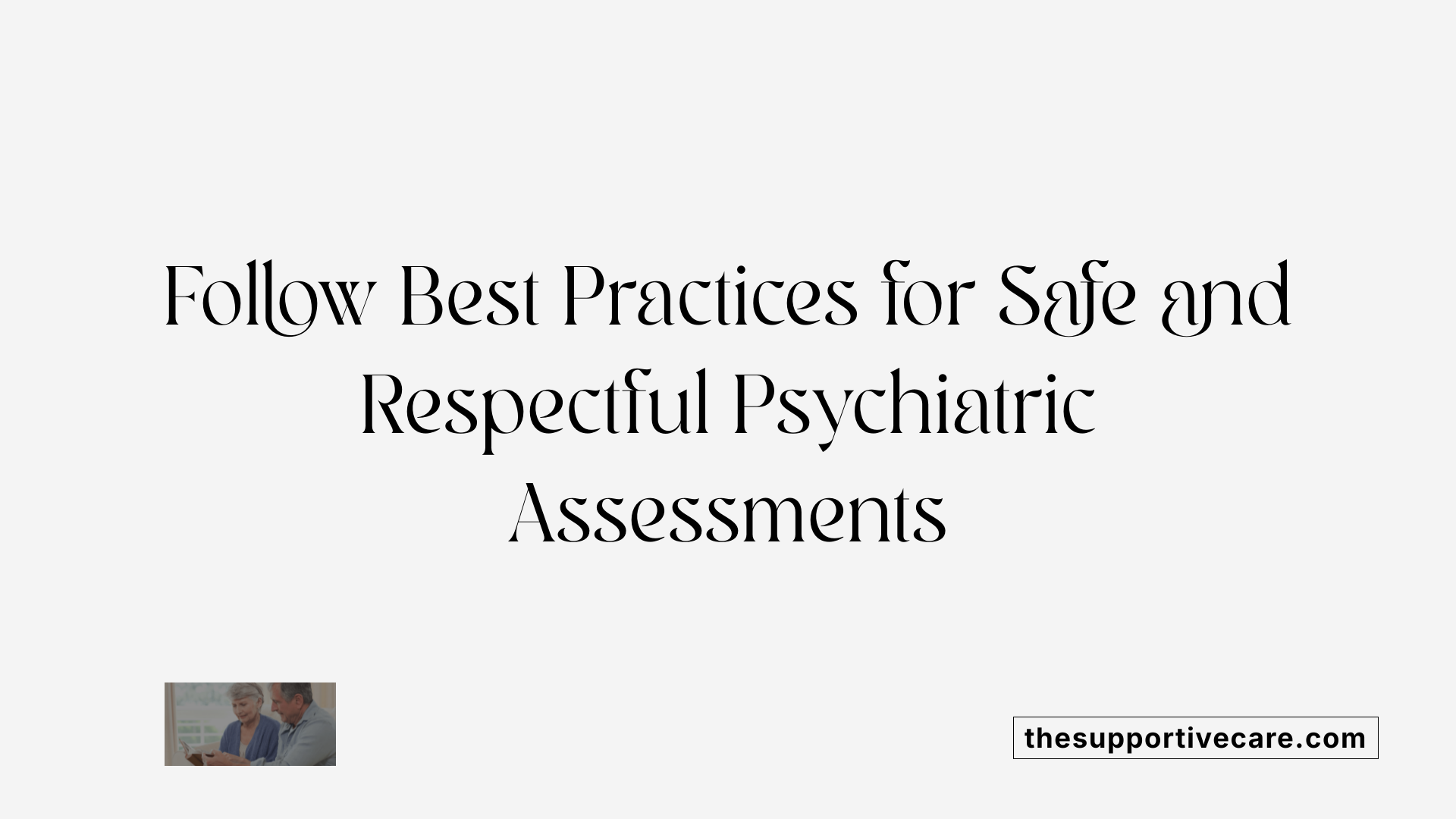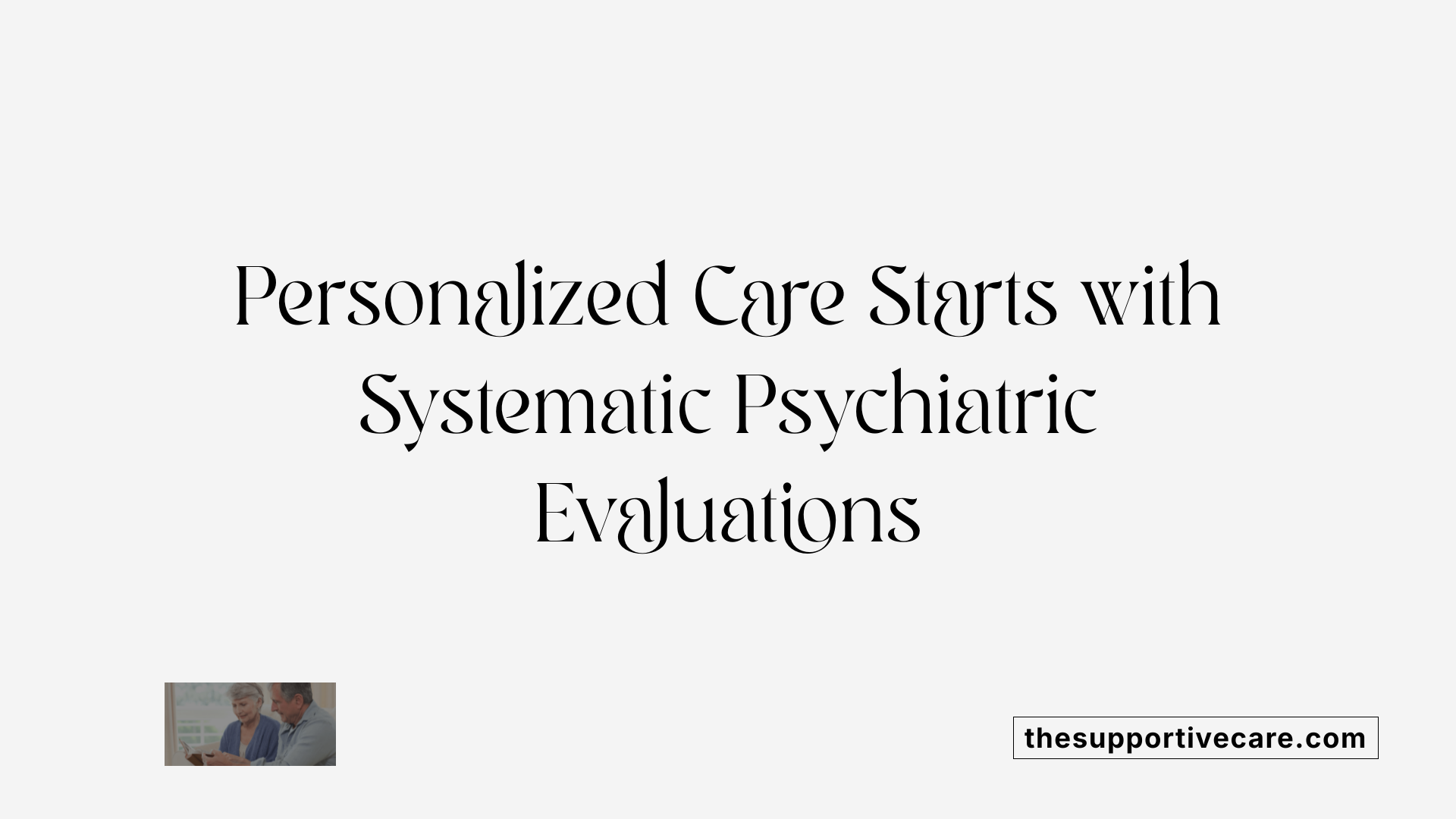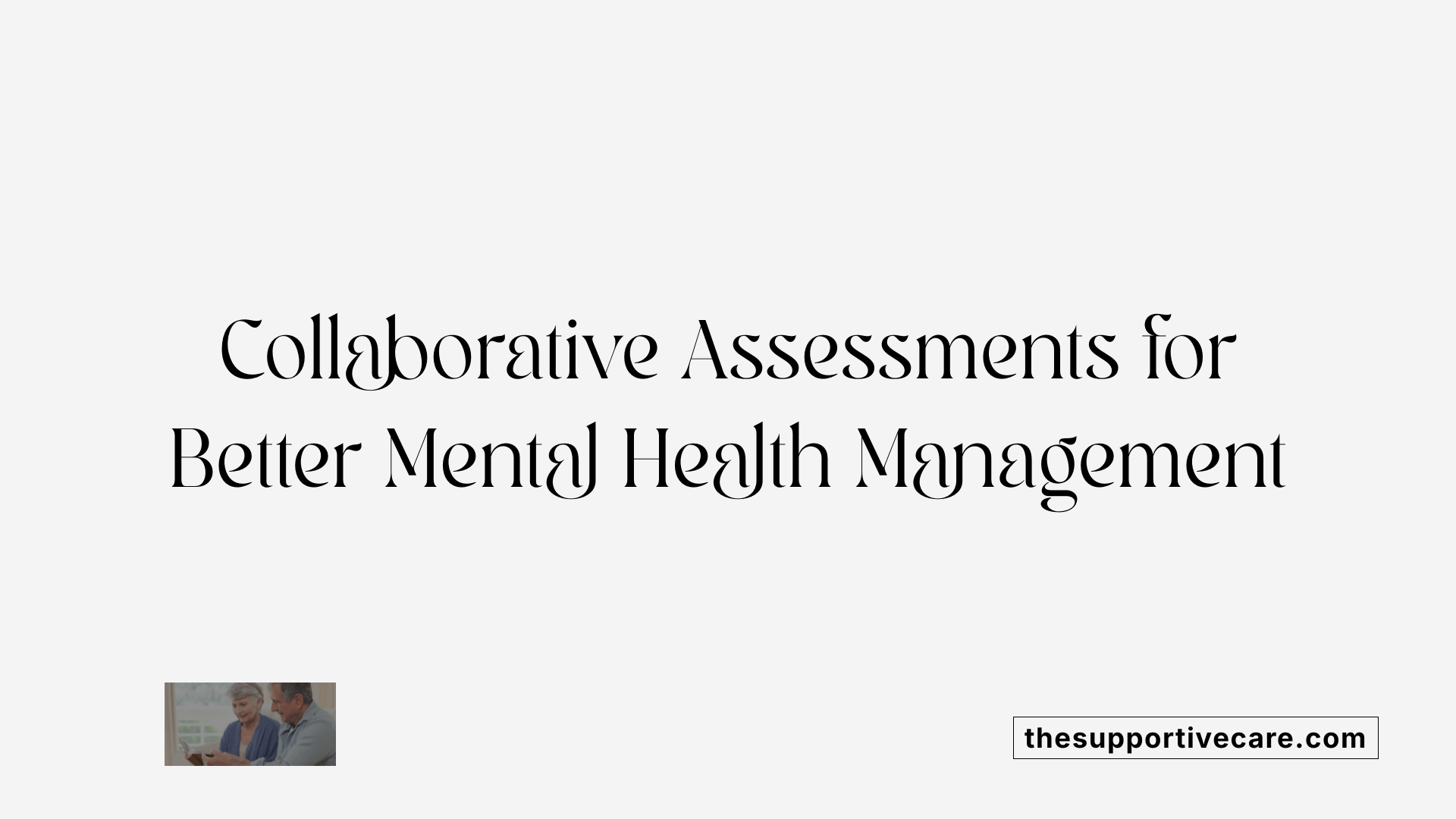Understanding the Critical Role of Psychiatric Evaluations in Long-Term Care
In long-term care facilities, the mental health of residents is as vital as their physical health. Regular psychiatric evaluations serve as a cornerstone in ensuring optimal care, early detection of mental health issues, and tailored treatment strategies. This article explores the significance, methods, regulatory frameworks, and broader impacts of routine psychiatric assessments, emphasizing their indispensable role in enhancing resident outcomes and facility management.
The Prevalence and Complexity of Mental Disorders in Long-Term Care Residents
What is the significance of regular psychiatric evaluations in long-term care settings?
Regular psychiatric evaluations are essential components of quality mental health care in nursing homes and other long-term care facilities. Given that estimates show between 65% and 91% of residents have significant mental health conditions, early and consistent assessment helps identify conditions such as dementia, depression, bipolar disorder, anxiety disorders, and serious mental illnesses like schizophrenia.
These evaluations enable healthcare providers to detect symptoms early, which is critical for initiating timely interventions and creating tailored treatment plans. Regular assessments improve the accuracy of diagnoses, monitor changes in mental status, and guide decision-making regarding medication adjustments and non-pharmacological therapies. They also help in identifying residents who may have unmet mental health needs, thus reducing inappropriate medication use and reliance on antipsychotics.
Furthermore, psychiatric evaluations support staff understanding of residents’ emotional and behavioral conditions. This insight fosters better behavioral management strategies and enhances overall care quality. Systematic mental health reviews empower residents, safeguard their rights, and contribute to better long-term outcomes, including decreased hospitalization rates and improved quality of life.
In sum, ongoing mental health assessments are vital. They not only serve as diagnostic tools but also promote a holistic, resident-centered approach that addresses the complex mental health needs of an aging, often medically frail population in long-term care.
How prevalent are mental health disorders among nursing home residents?
Research indicates a very high prevalence of mental health issues within long-term care settings. Approximately 80% of nursing home residents have diagnosable psychiatric disorders, with dementia being the most common. This neurodegenerative condition is present in the majority, but many residents also suffer from depression, anxiety, bipolar disorder, and other serious mental illnesses.
Despite this high prevalence, less than 20% of residents with psychiatric conditions receive specialized mental health services. This discrepancy highlights significant gaps in care, stemming partly from staff shortages, inadequate training, and limited access to mental health professionals on-site.
The complexity intensifies because many residents have multiple coexisting health issues, including medical and psychiatric comorbidities. This overlap complicates diagnosis and treatment, emphasizing the need for comprehensive, interdisciplinary psychiatric and psychological assessments.
What are the common psychiatric conditions and treatment challenges?
The most frequent mental health disorders among residents include dementia, depression, and serious mental illnesses like schizophrenia. Dementia not only affects cognitive function but often coexists with behavioral disturbances such as agitation, aggression, and psychosis.
Depression, which affects a significant portion of the elderly in care facilities, often goes underdiagnosed or undertreated, despite the availability of effective therapies. Serious mental illnesses, although less common, require specialized management and coordination with psychiatric specialists.
Behavioral issues related to psychiatric conditions pose particular challenges. They often lead to increased hospitalization and use of restrictive medications, including antipsychotics, which are regulated and ideally used as a last resort. Emphasizing nonpharmacological interventions, staff training, and timely psychiatric consultations can mitigate these issues.
Overall, the complexity of mental health in nursing homes demands a comprehensive and proactive approach. Regular evaluations, combined with staff education and interdisciplinary collaboration, are fundamental to managing the diverse and co-occurring mental health needs of residents.
Regulatory Frameworks and Challenges in Mental Health Care

What are the recommended practices and regulations for conducting psychiatric evaluations in long-term care facilities?
Psychological and psychiatric evaluations in long-term care settings must follow established standards to ensure accuracy, safety, and respect for residents’ rights. These evaluations are essential for identifying current mental health issues, guiding treatment, and preventing deterioration of conditions.
Recommended practices include using standardized assessment tools that are adapted for older populations, taking into account cognitive impairments, sensory deficits, and cultural backgrounds. Evaluators should conduct thorough reviews of medical, psychological, and social histories, and evaluate behavioral and emotional functioning comprehensively.
Staff involved in evaluations need proper training and supervision. Psychologists and other mental health professionals should maintain current knowledge of relevant guidelines, such as those from the American Psychological Association (APA) and federal regulations like PASRR (Preadmission Screening and Resident Review). These frameworks specify the need for ongoing screening, reassessment, and documentation.
Ethical considerations are paramount. Informed consent must be obtained, respecting residents’ autonomy and privacy. Confidentiality and data protection are critical, especially when residents have cognitive impairments that limit their decision-making capacity. When necessary, surrogate decision-makers should be involved.
Effective assessments require interdisciplinary collaboration. Medical professionals, psychologists, social workers, and nursing staff should work together to develop individualized, evidence-based treatment plans. Regular review of the evaluation process and outcomes helps ensure continuous quality improvement.
Documentation should clearly record assessment findings, diagnostic impressions, and treatment recommendations, aligning with regulatory standards. This ensures legal compliance and supports transparency.
By following these practices, long-term care facilities can promote better mental health outcomes, uphold ethical standards, and meet regulatory requirements that safeguard resident well-being.
The Impact of Routine Evaluations on Resident Outcomes

How do mental health assessments influence resident outcomes and care quality in long-term care facilities?
Routine psychiatric evaluations are central to optimizing mental health care for nursing home residents. These assessments, conducted by trained mental health professionals, help in early detection of mental disorders such as depression, anxiety, or behavioral abnormalities. Early diagnosis allows for timely, personalized interventions, which can significantly improve residents' well-being.
Effective assessments also guide the development of tailored treatment plans. By understanding each resident’s unique emotional, behavioral, and medical background, care teams can implement specific therapies or medication regimens that best suit individual needs. This personalized approach enhances treatment adherence and effectiveness.
Furthermore, regular evaluations contribute to reducing the inappropriate use of medications, such as antipsychotics, which are often overprescribed in this setting. Precise diagnosis and ongoing assessment support the consideration of non-pharmacological strategies and appropriate medication adjustments, thereby mitigating risks associated with unnecessary drug use.
Improvements in assessment practices ultimately lead to better quality of life for residents. When mental health needs are properly addressed, residents experience fewer behavioral disturbances, less emotional distress, and an increased capacity for social engagement. This holistic approach fosters a more supportive environment, reducing hospitalization rates and promoting overall well-being.
Despite these potential benefits, challenges persist. Many facilities lack sufficient mental health staffing, and assessments might not be performed regularly or thoroughly enough. The impact of COVID-19 and social isolation has also complicated mental health management by limiting social interactions and access to evaluators.
Overall, consistent and comprehensive mental health assessments are vital for enhancing resident care. When paired with adequate resources, staff training, and interdisciplinary collaboration, these evaluations can significantly influence positive resident outcomes, ensuring care quality keeps pace with the complex needs of aging populations.
Early Psychiatric Evaluations: A Preventive Approach
Why are early mental health assessments crucial for long-term care residents?
Early psychiatric evaluations play a vital role in the health management of residents in nursing homes and long-term care facilities. These assessments are essential for the timely detection of mental health issues, which helps in initiating prompt and appropriate treatments before conditions worsen.
By conducting thorough evaluations at the onset of care or when any change in mental status occurs, healthcare professionals can establish accurate diagnoses. This process involves reviewing the resident's medical history, behavioral patterns, emotional state, and social factors, providing a comprehensive understanding of their mental health needs.
Early assessments also help in creating personalized treatment plans that may include medication, therapy, or lifestyle modifications. Addressing mental health concerns early can prevent the progression of disorders such as depression, anxiety, or psychosis, thereby reducing the likelihood of secondary complications.
Moreover, early detection decreases the emotional and practical burden on residents, their families, and caregivers by minimizing crisis situations and care disruptions. It also ensures that residents are placed in the most appropriate settings, aligning with their needs and reducing unnecessary institutionalization.
Cost-effectiveness is another significant benefit. Intervening early often reduces the need for more intensive and expensive interventions later, such as emergency hospitalizations or long-term psychiatric admissions.
In summary, early psychiatric evaluations serve as a preventive measure that safeguards residents’ mental health, improves their overall well-being, and enhances the quality of long-term care by fostering a proactive rather than reactive approach.
Methods and Purposes of Psychiatric Assessments
What are the methods and purposes of psychiatric assessments for residents in long-term care?
Psychiatric assessments in long-term care facilities are critical tools used to comprehensively understand a resident’s mental health status and guide effective treatment. These evaluations incorporate a variety of techniques including structured interviews, behavioral observations, psychological testing, and review of medical and care records.
Interview methods often involve direct conversations with residents, focusing on mental, emotional, and behavioral symptoms. Staff or family members may be involved to provide additional insights, especially for residents with cognitive impairments. Observational assessments help identify behavioral patterns and behavioral symptomatic expressions that may not be fully captured through interview alone.
Psychological tests and neuropsychological assessments are commonly employed to evaluate cognitive functioning, distinguishing between different types of dementia, depression, or other mental health issues. Tools such as the Mini-Mental State Examination (MMSE), Geriatric Depression Scale, and various inventories specific to behavioral symptoms are standard.
The primary purposes of these assessments are diagnosis, treatment planning, and ongoing monitoring. They aim to identify mental disorders like depression, anxiety, and dementia, which are prevalent among nursing home residents. Accurate diagnosis informs personalized treatment strategies that integrate medication, therapy, and environmental modifications.
Beyond diagnosing mental health conditions, assessments evaluate residents’ decision-making capacities, functional abilities, and comorbid medical conditions to ensure ethical, safe, and appropriate care. Regular reevaluations are recommended to adjust treatments as residents’ conditions evolve.
The assessments also serve to monitor the effectiveness of interventions, minimize unnecessary medication use, and support recovery and quality of life. Overall, psychiatric evaluations foster a multidisciplinary approach, ensuring that residents receive care tailored to their complex and changing needs.
Best Practices and Ethical Considerations in Evaluations
What are the recommended practices and regulations for conducting psychiatric evaluations in long-term care facilities?
In long-term care settings such as nursing homes, conducting psychiatric evaluations requires adherence to established standards and regulations to ensure quality and ethical treatment. Best practices include employing assessment protocols that are specifically designed for older adult populations, accounting for common issues such as cognitive decline, comorbid health conditions, and psychosocial factors.
Evaluators, whether psychologists, psychiatrists, or other qualified mental health professionals, should possess specialized training and experience in geriatric mental health. This ensures assessments are thorough, accurate, and sensitive to the complex needs of residents. Staying up-to-date with evolving guidelines such as the American Psychological Association (APA) Recommendations and federal mandates like PASRR (Preadmission Screening and Resident Review) is crucial.
Legal and ethical standards emphasize obtaining informed consent — explaining the purpose, process, potential risks, and benefits of evaluations in a clear manner. Respecting residents’ confidentiality and privacy is fundamental, especially given the sensitive nature of mental health information.
Cultural competence plays a vital role in evaluation practices. It involves tailoring assessments to respect individual backgrounds, beliefs, and language preferences, and adapting assessment tools as necessary for residents with sensory impairments or cognitive limitations.
Interdisciplinary collaboration enhances the accuracy and relevance of evaluations. Psychologists and clinicians should work closely with medical staff, care providers, and residents' families to develop personalized, evidence-based treatment plans.
Routine monitoring and periodic reevaluation are essential to track changes in mental health status over time, adjust interventions, and ensure ongoing appropriateness of care. This process must align with legal frameworks that consider decision-making capacity and involve surrogates when residents are unable to provide informed consent.
Documentation should meet all regulatory requirements, providing clear records of assessments, decisions, and treatment recommendations. Such meticulous record-keeping promotes transparency and accountability, ultimately fostering a person-centered approach that respects the dignity and rights of each resident.
Compliance with these best practices not only meets regulatory standards but also advances the quality of mental health care in long-term care facilities, ensuring residents receive respectful, effective, and individualized evaluations.
The Role of Psychologists and Interdisciplinary Teams

What is the role of psychiatric evaluations in mental health management and policy compliance in long-term care?
Psychiatric evaluations hold a pivotal place in managing mental health within long-term care facilities such as nursing homes. These assessments help identify residents' psychological, emotional, and behavioral needs, guiding personalized care plans that aim to improve their quality of life.
By conducting thorough evaluations, mental health professionals ensure compliance with federal regulations like the Preadmission Screening and Resident Review (PASRR) and the Nursing Home Reform Act. These laws are designed to prevent inappropriate placements of residents with mental disorders and to guarantee they receive suitable and effective treatment.
Regular psychiatric assessments also support ongoing quality improvement efforts. They are integrated with tools such as the Minimum Data Set (MDS) to monitor residents' mental health progress, medication appropriateness, and risks like hospitalizations or misuse of psychotropic drugs. Such data contribute to quality indicators that help facility administrators and regulators evaluate and enhance care standards.
Furthermore, psychiatric evaluations foster better coordination among diverse care providers, including physicians, psychologists, social workers, and regulatory bodies. This collaboration supports a comprehensive approach to mental health care, addressing neuropsychiatric issues along with medical and social factors.
In summary, these evaluations are essential for safeguarding residents’ mental well-being, ensuring legal compliance, and guiding policy actions towards humane and effective mental health care in long-term settings.
Impact of Evaluations on Staff and Facility Operations
Psychiatric evaluations play a pivotal role in enhancing staff performance and the overall management of long-term care facilities. When residents undergo thorough mental health assessments, staff gain better insights into their residents’ psychological and behavioral needs. This knowledge allows staff to tailor their approaches, adopt more effective communication strategies, and recognize early signs of mental health deterioration.
Targeted staff training complements these evaluations by equipping caregivers with essential skills to manage psychiatric symptoms, behavioral disturbances, and medication administration more confidently and competently. Even modest improvements from such educational programs lead to increased staff confidence, positively influencing residents’ symptom management and emotional well-being.
Furthermore, incorporating psychiatric consultation into routine care routines facilitates more accurate diagnosis and treatment decisions. This collaboration ensures that residents receive appropriate interventions, which can reduce unnecessary hospitalizations and the overuse of medications.
From an operational standpoint, these practices improve resource allocation. By enabling staff to identify issues early and manage them effectively on-site, facilities can decrease emergency interventions and long-term costs associated with hospitalization.
Overall, integrating psychiatric evaluations with staff education fosters a more competent, responsive, and efficient care environment. It enhances residents’ quality of life, supports staff development, and promotes better facility management, creating a cycle of continuous improvement in long-term care settings.
Fostering a Culture of Mental Health Awareness and Quality Care
In conclusion, routine psychiatric evaluations are fundamental in shaping a compassionate, effective, and compliant long-term care environment. They enable early detection, personalized treatment, and ongoing management of residents' mental health needs while supporting staff development and facility efficiency. Reinforcing adherence to regulatory standards and adopting best practices in psychiatric assessments ensures sustained improvements in care quality, resident satisfaction, and overall well-being. Cultivating a culture that values mental health as integral to holistic care ultimately leads to better outcomes for residents and a more resilient, informed caregiving community.
References
- Quality of Mental Health Care for Nursing Home Residents
- Practical Geriatrics: Psychiatric Consultation to Nursing Homes
- Psychologists in Long-Term Care (PLTC) Guidelines for ...
- Preadmission Screening and Resident Review - Medicaid
- Why Early Psychiatric Assessments Improve Treatment
- Mental Health Services in Nursing Homes - Psychiatry Online
- Why and When Do I Need A Psychiatric Evaluation? - MHM Group
- Understanding the Importance of Long-Term Treatment in Mental ...


































































































